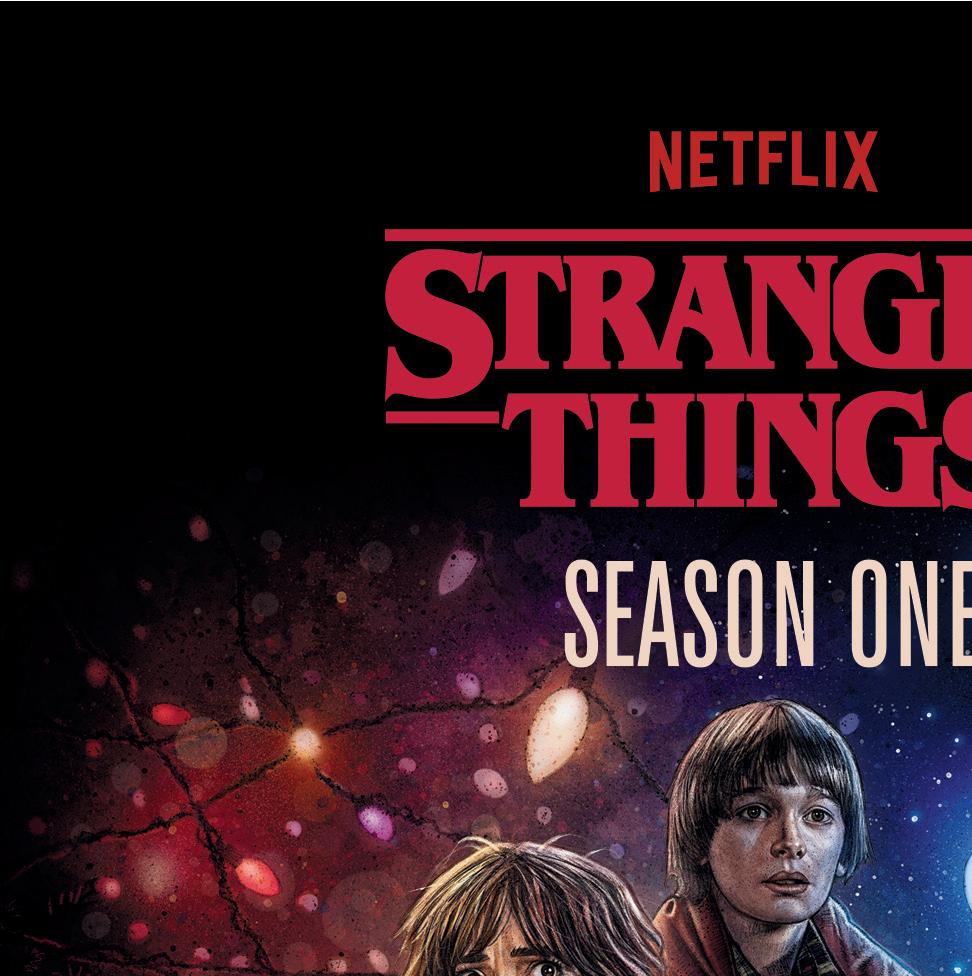

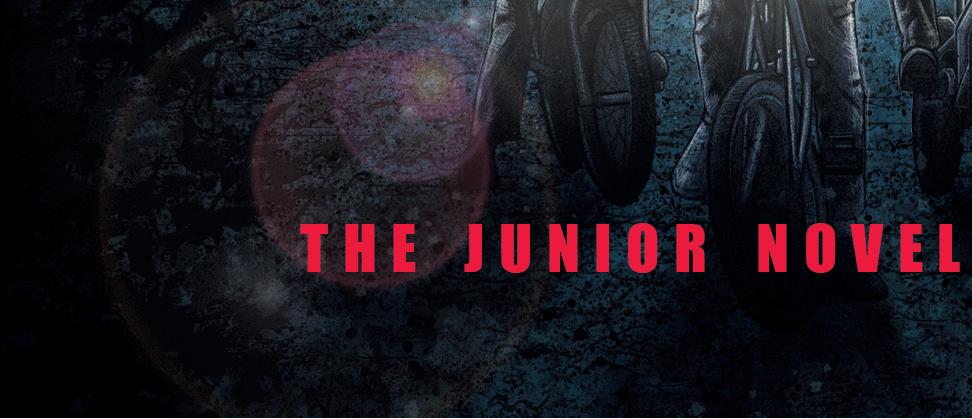

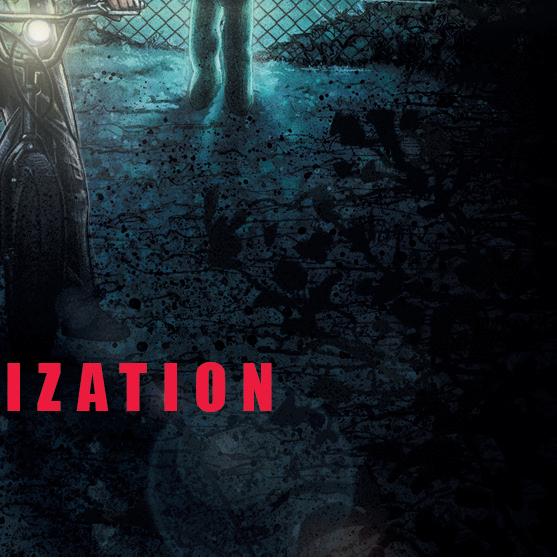






UK | USA | Canada | Ireland | Australia India | New Zealand | South Africa
Penguin Books is part of the Penguin Random House group of companies whose addresses can be found at global.penguinrandomhouse.com. www.penguin.co.uk www.pu n.co.uk www.ladybird.co.uk
First published in the USA by Random House Books for Young Readers, an imprint of Random House Children’s Books, a division of Penguin Random House LLC, 2025 is edition published in Great Britain 2025 001
Copyright © 2025 by Net ix Inc. All rights reserved.
Stranger ings and all related titles, characters, and logos are trademarks of Net ix Inc.
Penguin Random House values and supports copyright.
Copyright fuels creativity, encourages diverse voices, promotes freedom of expression and supports a vibrant culture. ank you for purchasing an authorized edition of this book and for respecting intellectual property laws by not reproducing, scanning or distributing any part of it by any means without permission. You are supporting authors and enabling Penguin Random House to continue to publish books for everyone. No part of this book may be used or reproduced in any manner for the purpose of training arti cial intelligence technologies or systems. In accordance with Article 4(3) of the DSM Directive 2019/790, Penguin Random House expressly reserves this work from the text and data mining exception.
Set in Minion Pro Typeset by Six Red Marbles UK, etford, Norfolk Printed and bound in Great Britain by Clays Ltd, Elcograf S.p.A.
e authorized representative in the EEA is Penguin Random House Ireland, Morrison Chambers, 32 Nassau Street, Dublin D02 YH 68
A CIP catalogue record for this book is available from the British Library
ISBN : 978–0–241–80674 –6
All correspondence to: Penguin Books
Penguin Random House Children’s One Embassy Gardens, 8 Viaduct Gardens, London SW 11 7BW
Penguin Random Hous e is committed to a sustainable future for our business, our readers and our planet. is book is made from Forest Stewardship Council® certified paper.


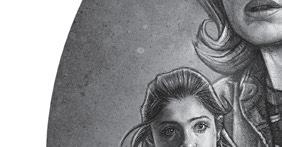
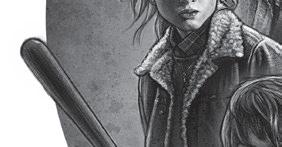
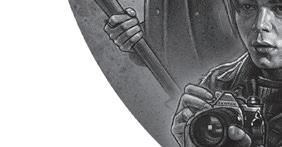

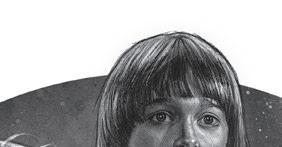
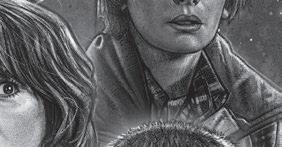
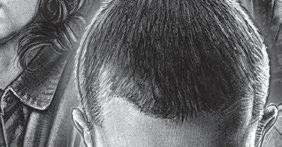
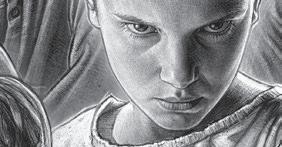
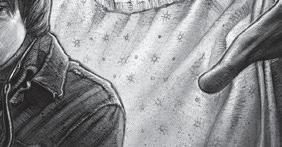
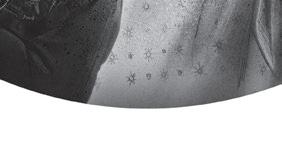

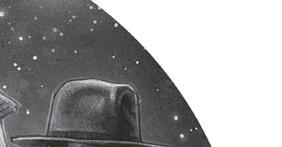
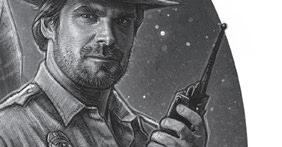
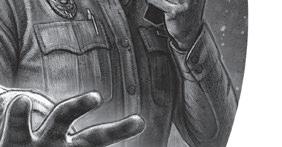
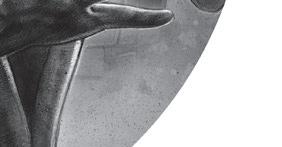

by Matthew J. Gilbert
Based on the television series Stranger ings, created by e Du er Brothers.
Based on the episodes “ e Vanishing of Will Byers,” written by e Du er Brothers; “ e Weirdo on Maple Street,” written by e Du er Brothers; “Holly, Jolly,” written by Jessica Mecklenburg; “ e Body,” written by Justin Doble; “ e Flea and the Acrobat,” written by Alison Tatlock; “ e Monster,” written by Jessie Nickson-Lopez; “ e Bathtub,” written by Justin Doble; and “ e Upside Down,” teleplay by e Du er Brothers, story by Paul Dichter.

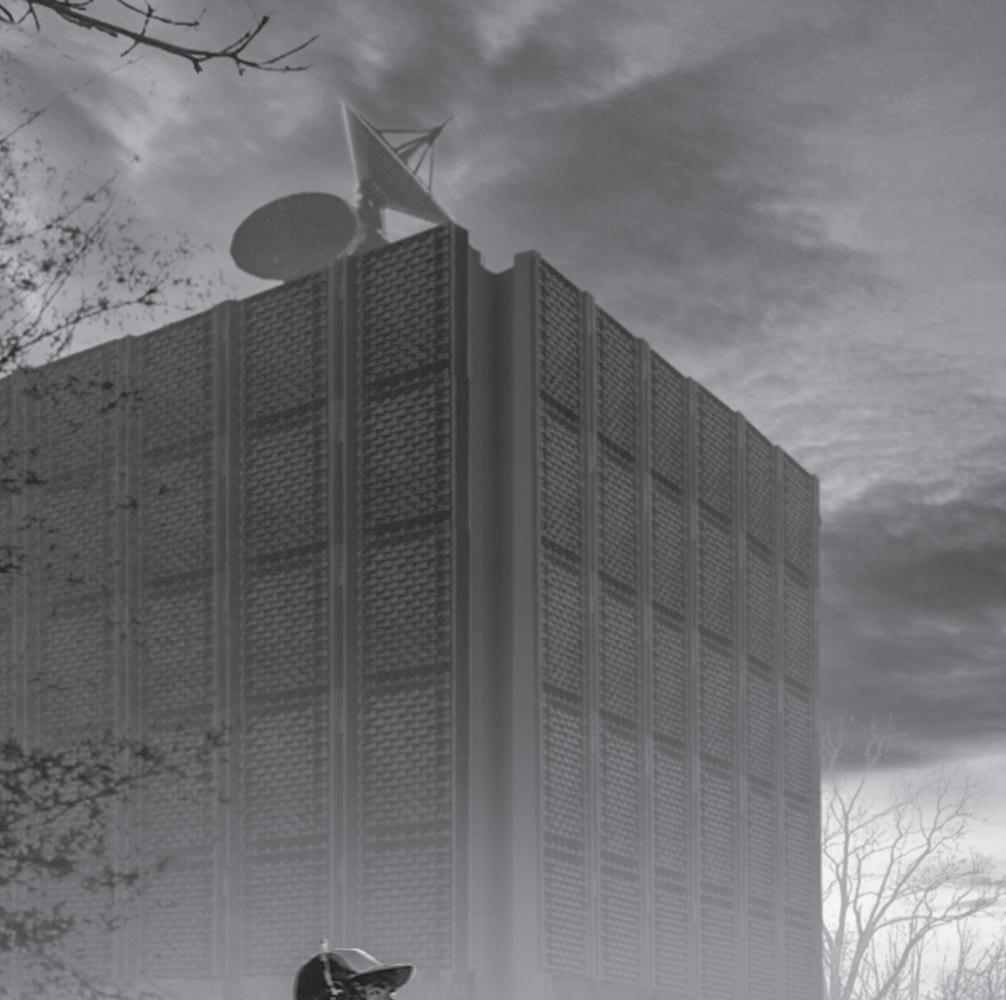
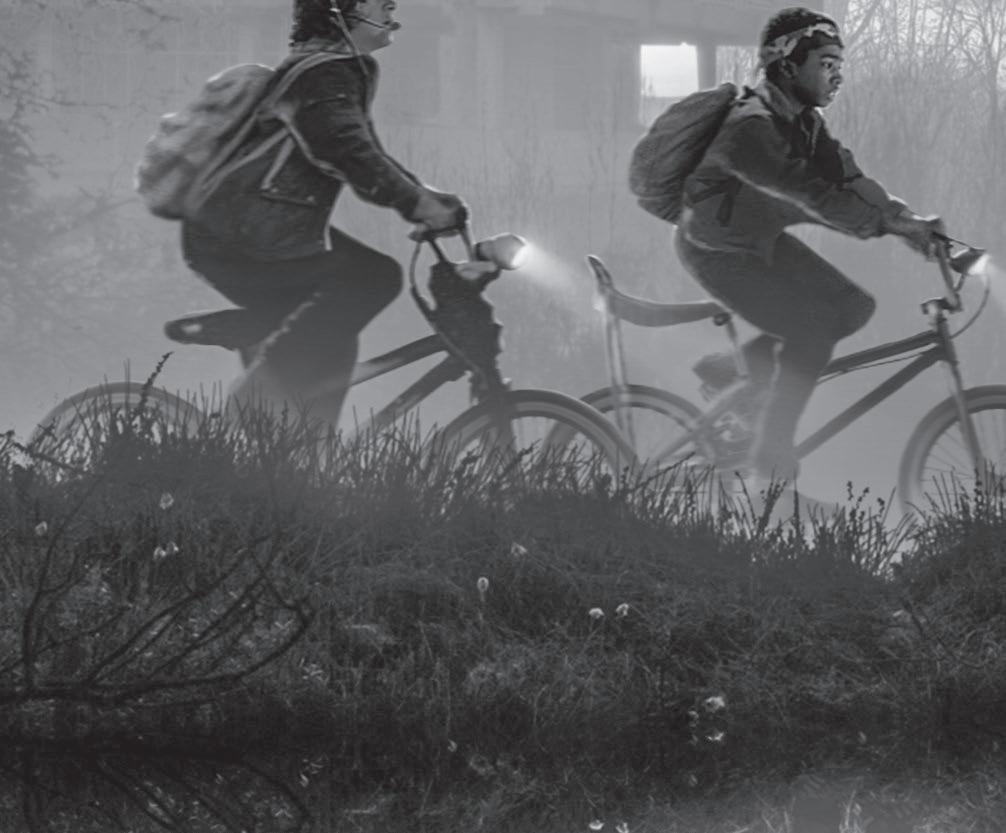

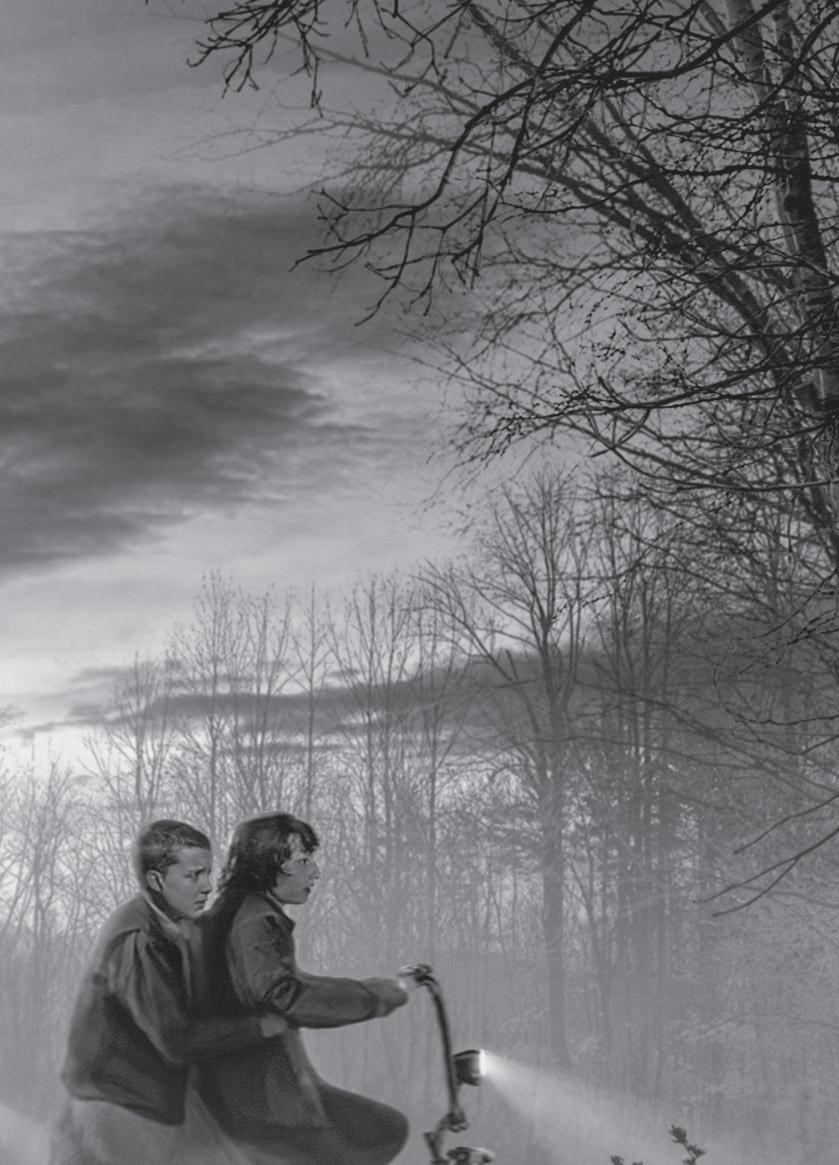
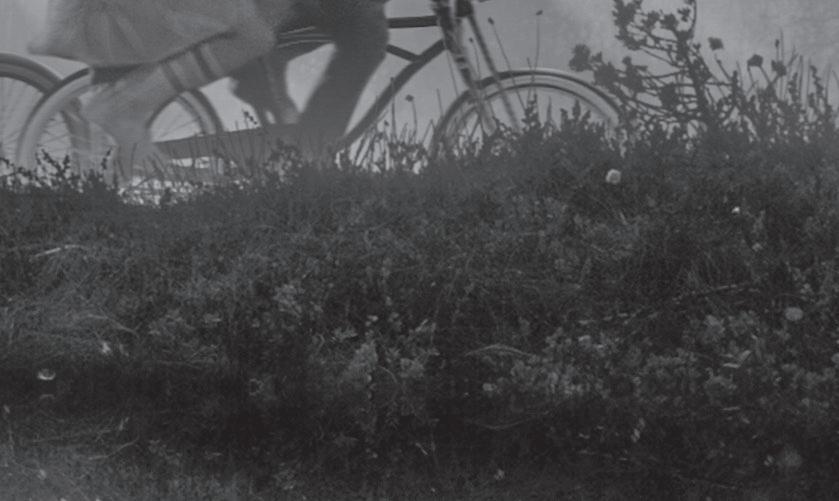
November 6, 1983
Darkness had come to Hawkins, Indiana.
Beyond the quiet neighborhoods, out past the streetlights, where the stars were the only things lighting a path for miles around, stood a mysterious building that had no business being in a small town like this one.
Hawkins National Laboratory had no o cial address. No sign out front. Only people with top security clearance knew about the horrors that occurred within its walls . . .
Inside the lab, lights ickered and alarms sounded. A scientist in a white coat came running down the hallway toward an elevator. He was breathing heavily—sweat dripping from his brow. e scientist frantically hit the call button over and over again, praying to hear the familiar ding of the elevator arriving. As he waited, the man was careful to look behind him . . .
. . . To see if he was being followed. It was hard to tell. e strobing emergency lights made the shadows in the hallway jump. e coast seemed clear. Maybe he’d make it out of here alive.

DING! e elevator doors nally opened, and the sweaty scientist rushed inside. He mashed the Door Close button and tried to calm himself. He’d be out soon. He could slow down and catch his breath—away from the intensity of the blaring sounds.
And the strange growling noises. ey started low at rst, but grew louder . . . meaner . . . hungrier . . .
is startled the scientist, making him freeze up with fear, afraid to move an inch. Too scared to even blink. He wasn’t alone in the elevator.
Something else was in here with him. Something that snarled like an animal.
Against his better judgment, the man looked for the sound. It was coming from above him. He twitched, li ing his chin to look up . . .
And just as he caught a glimpse of the creature, it grabbed him before he could run. An unseen monster sucked the man up into the elevator sha with one swoop. e elevator doors closed. And there was no way for anyone else to hear his screams.
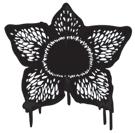

Twelve-year-old Mike Wheeler issued a stern warning to his friends. “Something is coming,” he said. “Something hungry for blood.”
His words hung in the air. Silence followed.
He could have been talking about whatever was lurking in the lab miles away, but he knew nothing about that. No one in town did. No, Mike was talking about a di erent kind of monstrous threat.
e kind that lived inside the illustrated pages of a Monster Manual.
It was dark in the basement of the Wheeler house, and that meant one thing: Dungeons and Dragons. It was a roleplaying game where players would act out death-defying feats as magical characters, and their fates would be decided by the roll of a twenty-sided die. e rest was up to Mike’s twisted imagination. As Dungeon Master, he’d created a fantasy campaign that would put his friends to the ultimate test. Would they be up to the challenge?
Overseeing the grid map, Mike continued his thrilling tale: “A shadow grows on the wall behind you, swallowing you in darkness . . . It is almost here!”
“What is it?” asked Will Byers, the Wizard of the group.
“What if it’s the Demogorgon?” Dustin Henderson nervously wondered aloud. His character was a Cleric.

“We’re so screwed if it’s the Demogorgon.”
Lucas Sinclair, the Ranger of the group, regained control of his team, trying to calm them down. “It’s not the Demogorgon.”
“An army of Troglodytes charge into the chamber!” Mike revealed, slamming his hand down dramatically. Everyone breathed a sigh of relief. Troglodytes were little lizard people who posed no real threat to any respectable D&D player—especially those with high-scoring characters like Mike and his friends.
e boys all laughed. If Troglodytes were the worst of what Mike had planned for them, this adventure would be a walk in the park.
“Wait a minute,” Mike said, his mood suddenly changing. “Do you hear that . . . that sound . . . ?” e others grew anxious now. Mike clearly had something else up his sleeve.
“Boom . . . Boom . . . BOOM!” Mike said, slamming down a new gure onto the table: a powerful creature that would make anyone’s skin crawl. It had scales, claws, and stood taller than any other monster on the map. It was spawned from pure darkness.
“ e DEMOGORGON!” Mike announced. Everyone threw their hands up in defeat.
“We’re in deep crap,” Dustin blurted out.

“Will, your action?” Mike asked.
“I don’t know,” Will snapped back, beginning to panic. e other boys leaned in, rapid- ring solutions to try to counter this new threat before it could doom them all.
“Fireball it!” Lucas shouted. His rst instinct was always to go on the attack.
“Cast a protection spell!” Dustin shouted—always trying to play it safe.
“Don’t be a wimp,” Lucas ordered. “Fireball him!”
“Cast Protection,” Dustin countered.
Mike slammed his hands down again, taking back control of the room. “ e Demogorgon is tired of your silly human bickering! It stomps toward you . . . BOOM!”
“Fireball!” Will yelled. He rolled the die recklessly and it ew o the table, bouncing somewhere into the unknown of Mike’s basement.
e boys all leapt up from their chairs, searching like mad for the missing die—like their lives depended on it!
“Where’d it go?” Lucas asked.
“I don’t know!” Mike said.
“Is it a thirteen?” Dustin shouted, hoping for a high number.
“I DON’T KNOW!” Will exclaimed.
Before they could learn their fate, a woman in a pink sweater appeared at the top of the stairs with the power to stop the campaign dead in its tracks. It was Mike’s mom, Karen.

“Mike!” she yelled, nally getting her son’s attention. Mike might have been the Dungeon Master, but this house was her domain.
“Mom, we’re in the middle of a campaign,” he pleaded.
“You mean the end? Fi een a er!” she said, reminding him of the time. It was getting late.
Mike followed her upstairs to the kitchen. “Just twenty more minutes!”
“It’s a school night, Michael,” she said.
“ e campaign took two weeks to plan. How was I supposed to know it was gonna take ten hours?”
“You’ve been playing for ten hours?!”
Mike just bit his tongue. He’d already said too much. He tried to get Dad to back him up, but that wasn’t going to happen. His father, Ted Wheeler, was only interested in hearing the TV set, and not much else.
“Listen to your mother,” Dad said, ddling with the TV antennae.
Mike sighed. While he tried (and failed) to negotiate for just twenty more minutes, Lucas and Will were confronted with an even worse number downstairs.
“Does the seven count?” Will asked, nding the die face up, showing a seven.
Lucas frowned—a seven wouldn’t be enough for their

party to survive the Demogorgon threat. At all. But maybe there was another way out of this.
“Did Mike see it?” Lucas asked, gears turning in his head. Will shook his head no.
“ en it doesn’t count,” Lucas said, hatching a plan to game the system. Will got his meaning and le the die undiscovered. e boys quietly packed up their gear and prepared to leave, but not before Dustin decided to take on a secret side quest of his own. As the other guys grabbed their coats, he grabbed what was le of the pizza they’d ordered and journeyed upstairs . . .
. . . To sneak a peek at Mike’s sister, Nancy.
She was older—now a cool high school girl who avoided “the dorks” to hang on the phone with her popular friends to talk about boys. Dustin worked up the courage to wave at her from the hallway. It took a few tries, but he nally got her to notice him. He showed her the pizza box and ashed a smile. “ ere’s a slice le if you want it. Sausage and pepperoni.”
A hopeful moment as she got up from her bed. “Hold on,” she told the person on the phone.
Dustin kept smiling . . . until she shut the door in his face. It was o cial: e boys had worn out their welcome at the Wheeler house. e fantasy was over, and all that was le was life outside in the real world.


Mike led his friends out to their bikes.
Lucas and Dustin were quick to race home through the darkness, but not Will. He hung back, clearly waiting for his moment to share something private with Mike.
“It was a seven,” Will confessed.
“Huh?” Mike asked, unsure what he was talking about. “ e roll . . . It was a seven. e Demogorgon, it got me.”
Before Mike could say anything, Will rolled forward down the driveway with a smile on his face. His usual nervousness melted away. He didn’t like keeping secrets—especially from his closest friends.
Now that the truth was out there, Will could ride home without a care in the world.

Will pedaled fast. He not only caught up with Lucas and Dustin, he blazed past them like a blur. He eventually found himself as the only rider on a long, empty stretch of road. e streetlights got farther apart. e hum of crickets

grew louder. But the familiar sights and the sound of his bike treads skimming the street continued—even out here through the deep, dark forest. is was Will’s usual way home.
e boys nicknamed this route “Mirkwood,” a er the magical forest in one of their favorite books, e Hobbit. And it was a tting name too. Just like the fantasy world in that story, everything on this road de ed logic. e trees seemed to sway in a strange way. e darkness seemed to have eyes on him.
But Will knew that was impossible. ere wasn’t another soul in sight for miles.
Except something in the road dead ahead, stretching out . . .
A tall gure.
e sight of it startled Will, causing him to lose control of the bike. He swerved to avoid it, wheeling o the road and down a rough patch of dirt. His body was thrown clear over the handlebars.
Will picked himself up—his heart pounding. A low rumble could be heard coming from the trees. is wasn’t his imagination. He could barely see a thing through the shadows, but he knew something was there. It was growling at him.
He abandoned his bike and ran the rest of the way home.


Will ran for his life, then threw open the front door to his house. His dog, Chester, was there to greet him.
But no one else was.
“Mom?” Will cried. “Jonathan?”
Will’s voice echoed o the walls with no answer. His mom and brother were nowhere to be found. It was just him and the dog in the big, empty house . . . and whatever was waiting outside.
Will worked up the courage to look through the window. Maybe he’d lost it in the woods? Maybe he’d been fast enough to get away? What was that thing?
He squinted for a better look. ere, through the fog, he could see the familiar outlines of trees and the laundry hanging from the drying lines. But there was something else there too. A strange shape in waiting.
It stood like a man, but it wasn’t human.
Will gasped.
e thing from the road had followed him home!
Will ran to the phone and dialed 911. He waited for the voice of an operator, but all he got was static. “Hello? Hello?!”
e growling returned when the shadow crossed in front of Will’s front door.

Will sprinted out to the backyard and into his dad’s old work shed. He pulled a hunting ri e o the wall and, through the shakes, managed to load the weapon. He took aim.
Will was breathing heavy. He knew the next few moments would decide whether he lived or died.
Suddenly, the growl could be heard through the toolshed walls. e gure was approaching and ready to pounce. Will focused, ready to open re—when something else caught his eye.
Something even stranger was happening inside the shed. e lightbulb above him was shining brighter than ever before. So bright it was about to burn out. e hum of its electricity seemed to blend with the creature’s growling. As if they were one and the same.
Will couldn’t explain it. He also couldn’t run anymore. He simply looked up at the light and vanished into thin air. It was all over in a ash.



Hawkins Middle School was bustling with activity. ere were students locking their bikes, getting o buses, and debating whether to cut class before the bell beckoned them all inside for another day of learning. Every kid in Hawkins was in attendance.
Every kid except one. Mike, Lucas, and Dustin looked all around but couldn’t

nd Will in the sea of student faces. Mike assumed they’d spot him here—especially a er the call earlier that morning. Will’s mom, Joyce, had phoned his house looking for her son. Apparently, he wasn’t around for breakfast. Odd, but not out of the ordinary, Mike thought. Will could be like that sometimes.
Mike, his mom, and even Joyce eventually agreed that it had to be that Will was simply getting a head start on school. Now Mike wasn’t so sure.
“ at’s weird,” he said. “I don’t see him.”
“I’m telling you, his mom’s right,” Lucas said, trying to calm things down as always. “He probably just went to class early again.”
“Yeah, he’s always paranoid Gursky’s gonna give him another pop quiz.” Dustin chuckled. Just then, an unwelcome voice piped up into their conversation. “Step right up, ladies and gentlemen,” they heard a kid say.
ey all sighed, knowing full well it was James, approaching with his friend Troy, Hawkins Middle’s resident bullies. “Step right up and get your tickets to the freak show,” Troy teased them. “Who do you think would make more money in a freak show?”
e boys quietly stood their ground.

ey were used to the abuse. Maybe too used to it.
“Midnight, Frogface, or Toothless?” Troy smirked, giving Lucas, Mike, and Dustin nicknames, in that order.
“I’d go with Toothless,” James replied with a fake lispy voice that mimicked Dustin’s speech impediment.
“I told you a million times, my teeth are coming in,” Dustin shot back. “It’s called cleidocranial dysplasia.”
James laughed. Troy ignored all that, demanding Dustin “do the arm thing.”
On cue, Dustin dropped his books and removed his coat. He then stretched his arms the wrong way across his body. His bones made a painful cracking sound. e bullies were both disgusted and pleased at the result.
Dustin was indi erent. To them, his body was weird; to him, it was normal.
“Jerks,” Lucas said under his breath as the bullies walked away.
“I think it’s cool,” Mike said to cheer Dustin back up. “It’s like you have superpowers or something. Like Mr. Fantastic.”
Dustin smiled and shrugged. “Yeah, except I can’t ght evil with it.”


Meanwhile, across town, Hawkins Police Chief Jim Hopper reported to the precinct for duty, expecting to nd co ee and donuts. Or as he preferred to call it, co ee and contemplation.
What he got instead was an upset woman, pacing nervously in his o ce. Her hair was a mess, her eyes pu y and stained from crying for hours. is was Joyce Byers.
She wanted to le a missing person report for her son Will.
“I’m going out of my mind!” she said, her eyes darting every which way.
Hopper didn’t look a bit worried. “Look, boy his age, he’s probably just playing hooky, okay?”
“Not my Will. He’s not like that.”
“You never know. I mean, my mom thought I was on the debate team, when really I was just chasing girls in my dad’s Oldsmobile.”
“Look, he’s not like you, Hopper. He’s not like me. He’s not like . . . most.”
Joyce went on to tell Hopper that she knew Will was being bullied, that kids at school made fun of the way he dressed and how sensitive he could be. He had a few friends but he had more enemies. Even Will’s father had bullied him when he was still living at home. Joyce had separated from the man, and he had moved away to another state.
With that, Hopper leaned forward, con dent that he’d cracked the case.

“Joyce!” He looked right at her. “Ninety-nine out of a hundred times a kid goes missing, the kid is with a parent or relative.”
“What about the other time?” Joyce asked.
Hopper was confused. “What?”
“You said ‘ninety-nine out of a hundred,’ ” Joyce explained, already thinking the worst. “What about the other time?”
“Joyce, this is Hawkins, okay? You wanna know the worst thing that’s ever happened here? It was when an owl attacked Eleanor Gillespie’s head because it thought that her hair was a nest.”
Joyce sighed. She wasn’t in the mood for funny stories. She didn’t need someone to help her feel better. She needed someone to locate her son.
“Just nd my son, Hop.”

Hawkins National Laboratory was o cially under quarantine, and Dr. Martin Brenner was in charge. A sospoken man with a calm demeanor, he wasn’t seen “on site” very o en, preferring to work from the shadows.
But today was di erent. ere was an incident involving the disappearance of a scientist that needed his attention.

Something had gone very, very wrong last night. And the situation was evolving.
Brenner suited up in the same protective hazmat suit everyone else wore. He zipped the plastic visor over his brightwhite hair and followed a team of scientists into the elevator. ey were about to get a rsthand look at the damage.
DING! e doors opened to a nightmarish scene. e lights were burned out, there were patches of strange black mold on the walls, and the corridor was lled with a thick haze. Ghostly white particles uttered through the air like snow akes.
Despite all this, Brenner kept his cool—his attention focused on something across the room. He raised his ashlight for a closer look.
e far wall was covered in a wet black substance. Bubbles boiled over on its surface, releasing spores. It appeared to be a mold outbreak of the worst sort—wet and decaying growth spreading as far as the eye could see. Upon closer inspection, Brenner realized the “mold” was moving.
Almost like it was alive.
A hole began forming in the center of the substance, as if it could somehow sense their presence. It was beckoning them inside its ri , opening like a doorway.
But to where?
In time, Brenner would have all the answers. But rst, he

had to get his priorities in order, and there was something even more pressing than this.
“ e girl?” someone cryptically asked him.
Brenner considered the question. “She can’t have gone far.”

“ at girl” had traveled miles away. Walking through the woods all night, barefoot and in a hospital gown.
She was on her own for the rst time in her life. And she was hungry.
A er hours of seeing nothing but trees, she found herself staring at a run-down restaurant on the side of the road: benny’s burgers.
She could hear music playing inside. And people.
Smells clung to the air. Something was cooking. e girl cautiously made her way toward the smells, careful to stay hidden. She snuck inside, tiptoeing into the kitchen the way a mouse would. She eventually found scraps of food. Crispy, crunchy things to satisfy her hunger.
She scarfed them down, stopping only when she heard someone yell, “Hey!”
It was a man in a white apron. e girl panicked, grabbing the food and heading for the door to escape.

“ ink you can steal from me, boy?” He grabbed ahold of her arms.
e man looked fuming mad until he saw her face. He instantly so ened, looking at her like a child. Because she was.
A scared child.
Now the man was confused. “What the hell?”

Back at school, Mike, Dustin, and Lucas were pulled out of AV Club by their principal.
And the cops.
Police Chief Hopper and his deputy sat them down to ask them about Will. e boys all talked over each other at the same time—much to Hopper’s annoyance.
“One at a time, all right?” he barked. “You said he takes what?”
“Mirkwood,” Mike answered.
“ at sounds made up to me,” the deputy o cer said.
“It’s not. It’s from Lord of the Rings,” Lucas told him.
Dustin corrected him. “ e Hobbit.”
is caused Lucas and Dustin to bicker, which Hopper shut down again with a stern voice. “Hey! What did I say? One . . . at a . . . damn . . . time.”

e boys quieted down, leaving Mike to answer. “Mirkwood. It’s a real road. It’s just the name that’s made up. It’s where Cornwallis and Kerley meet. We can show you if you want.”
“I know it.”
“We can help look,” Mike o ered.
“No,” Hopper growled. “A er school, you are all to go home. at means no biking around looking for your friend, no investigating, no nonsense. is isn’t some Lord of the Rings book.”
“ e Hobbit,” Dustin corrected out of habit.
Hopper had lost his patience. He stood up, towering over the boys. At over six foot, he was an intimidating man. “Do I make myself clear?”
Mike, Lucas, and Dustin wanted nothing more than to help with the search, but they had pressed their luck far enough with the chief. ey simply nodded their heads and hoped for the best.

e man in the white apron closed Benny’s Burgers early that day. He could do that. He was the Benny the place was named a er.

And in this place—his place—Benny wanted to make sure his mysterious new guest felt safe without the prying eyes of strangers.
e girl clearly meant no trouble, she was just hungry. Maybe a runaway? he thought.
Benny didn’t judge, he just wanted to feed her a good meal. So, he cooked the girl a burger and some fries and watched her scarf it down in record time.
“Your parents forget to feed you?” Benny asked her. “Is that why you ran away?”
e girl didn’t answer—she just kept chewing. She hadn’t said a single word since he caught her.
“ ey hurt you?” Benny asked, trying to piece together what happened. “You went to the hospital, you got scared, you ran o , you wound up here. Is that it?”
Again, no answer.
Benny changed his approach. He gently took the burger back and looked the girl in the eyes. “I’ll give this back, and you can have as much as you want . . . but you gotta answer a few of my questions rst, all right?”
e girl just stared back at him, still an enigma.
Benny changed his approach again and gave her a warm smile. “My name’s Benny Hammond. Nice to meet you. And you are . . . ?”

All the girl could do was give him a frustrated look. She didn’t say a word.
As Benny reached out to shake her hand, he noticed something curious. e numbers 011 were tattooed on her wrist.
e girl pulled her arm back, clearly not pleased at having revealed anything.
“Eleven?” Benny asked. “What’s that mean?” e girl broke her silence. “No.”
“Well, I’ll be damned! She speaks,” Benny said. “What’s it mean?”
e girl thought it over. She nally pointed to her chest, introducing herself. “Eleven.” at was good enough for Benny. Now he knew her name and what to tell the authorities when he noti ed them about a missing girl in his restaurant. Hopefully they could learn a little more about her.
Benny slid the burger back to Eleven and excused himself to make a call.
When she was alone, Eleven looked at a rattling fan nearby. Its rusty blades were spinning and making a bothersome scraping sound. She stared at the fan, focusing, deep in thought, and somehow, without moving a muscle . . .
. . . caused it to stop.


True to his word, Hopper took his deputies out to the area where the roads of Cornwallis and Kerley met. Mirkwood, as the boys had called it.
e police scanned the surrounding woods for any sign of Will. As time ticked away and daylight began to fade, Hopper nally spotted something behind the trees.
A bike, overturned with its wheels in the air.
Will’s bike.
“I got something!” Hopper called out. e other deputies ran down to meet him, surveying the discovery for themselves.
“ at his bike?” one of the o cers asked.
“Yeah, he must have crashed,” Hopper replied.
“ ink he got hurt in the fall?”
“Not so hurt he couldn’t walk away. Bike like this is like a Cadillac to these kids. He would’ve walked it home.”
With a look of frustration, Hopper li ed the bike up into his arms to return to Joyce. It was time to accept that Will Byers had truly gone missing, and the clues to his whereabouts were out there somewhere, hidden in plain sight.
ree o cers wouldn’t be enough to search these woods. ere was only one thing le to do . . . organize a search party.


at night, the Wheelers sat down for family dinner. e mood was tense. Mike could barely sit still at the table. “We should be out there. We should be helping look for him.”
His mom reminded him about the conversation he’d had with Hopper at school. “ e chief said—”
“I don’t care what the chief said,” Mike interrupted. “We have to do something. Will could be in danger.”
“More reason to stay put.”
“Mom!”
“End . . . of . . . discussion.”
Mike frowned at his plate. An awkward silence fell over the dining room, until Nancy suddenly spoke up. “So . . . Me and Barbara are gonna study at her house tonight. at’s cool, right?”
“No, not cool,” Mom said, holding her ground. “Until we know Will is okay, no one leaves.”
“So we’re under house arrest?” Nancy angrily shot back. “Just because Mike’s friend got lost on the way home . . . ?”
Mike could feel himself getting angry. Nancy had crossed a line. “So, this is Will’s fault?”
“Nancy, take that back!” Mom said, trying to keep the peace, but the ght was only ramping up.

“You’re just mad because you want to hang out with STEVE,” Mike said, loud enough for everyone to hear. Nancy’s eyes grew wide.
“Steve?” Dad uttered.
“Who is Steve?” Mom asked.
“Her new boyfriend,” Mike explained, all too happy to spill her most private secrets to Mom and Dad. It was only fair a er what she said.
“You are such a jerk, Mike!” Nancy said, storming o to her room.
“I’m the only one acting normal here,” Mike shouted back. “I’m the only one that cares about Will!”

At nightfall, sha s of light suddenly pierced the darkness.
“Will!” voices cried out. “Will Byers!”
e ashlights of brave volunteers came shining through the misty woods. And there was Hopper out in front, leading a search party of police o cers, concerned parents, and even local teachers into the unknown. Some continued crying out for Will, while others silently focused on the ground, looking for anything out of the ordinary.
A man with a mustache introduced himself.

“Scott Clarke,” he said, o ering a friendly handshake. “I teach at Hawkins Middle. Earth and biology.”
Hopper shook his hand and took a moment to notice the stars above. “I always had a distaste for science. Sara, my daughter, galaxies . . . the universe . . . She always understood that stu . I always gured there was enough going on down here, I never needed to look elsewhere.”
“Your daughter, what grade is she?” Mr. Clarke asked, intrigued. “Maybe I’ll get her in my class . . . ?”
“No, she uh . . . She lives with her mom in the city,” Hopper said, suddenly lost in thought. “ anks for coming out, Teach. We really appreciate it.”
And with that, Hopper excused himself and went ahead on his own.
To Mr. Clarke, it seemed Hopper was all business, not wanting to get too chummy with any of the volunteers. But the truth was much darker than that.
Another volunteer overheard the conversation and decided to share something with Mr. Clarke.
“She died a few years back,” the volunteer quietly told him.
Mr. Clarke wasn’t sure he heard that right. “Sorry . . . ?”
“His kid.”
e volunteer nodded toward Hopper.
Mr. Clarke looked ahead, suddenly seeing the police chief in a di erent light. Clearly this wasn’t just a job for Hopper.
